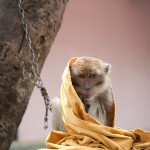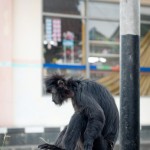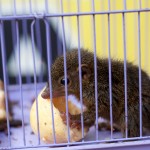Still so busy recovering from my trip to Java…but looking at the comments consistently on YouTube videos about how ‘happy’ lorises are in the hands of their ‘owners’ made me think I should write a post here.
Animals taken from the wild and put into a cage will rarely be ‘happy’. Some commentators stress these animals are now safe from predators, but for thousands of years, wild animals have been playing the game of predator and prey; some survive, some succumb. And in the case of lorises, they are pretty good at avoiding predators!
Some say that wild animals don’t need to look for food when kept as a pet and will be well-fed by their human companions. But with the best wills in the world, it is difficult to discover what wild animals need to stay healthy. Nutritional science, even to resolve health issues and diet for domesticated animals, is a multi-million dollar industry. Even the best zoos in the world can’t keep many exotic species due to difficulties with diet, and struggle with health and obesity issues.
Worst of all is that on a YouTube video we see into the life of an animal for just a few seconds. When the owner has seen it do something cute, or when the owner has decided to give it a few minutes of freedom, or when the owner has given its ‘pet’ a rare cuddle. This chastens us and makes us think the animal is happy caged for the other 23 hours of its life.
Such thoughts inspired me to make some educational materials from photographs taken by Andrew Walmsley during our recent trip to Java. (Please see the education pages). In particular, we saw the most sorrowful ebony langur – a threatened monkey endemic to Indonesia. For a few moments his owner came out and released the chain that kept him tethered to a post. The monkey looked out for comfort, the owner smiled. What a lovely happy YouTube video that would make. Within seconds, growing tired of his plaything, the monkey was chained again to the post to breathe in the fumes of traffic, to sit alone, and to eat bananas and rice – a diet wholly unsuitable to an animal fully adapted to eat leaves.



